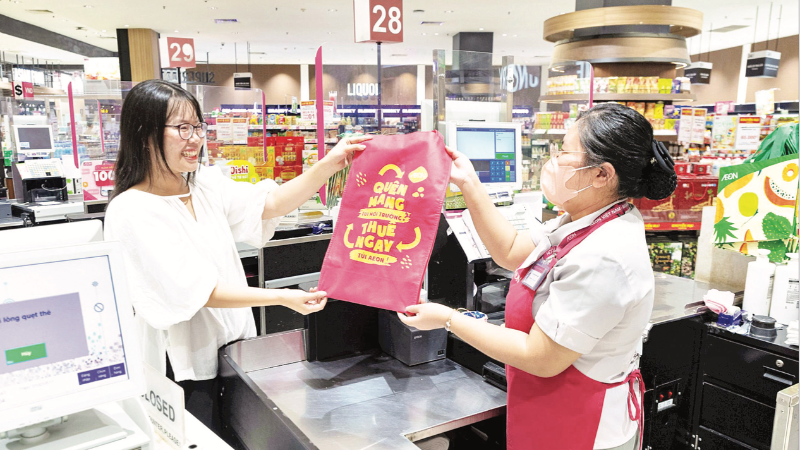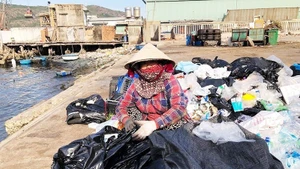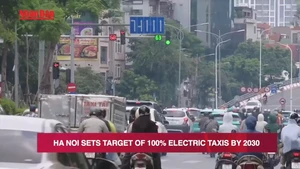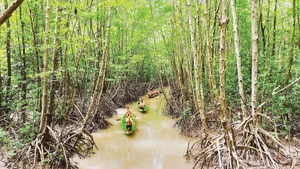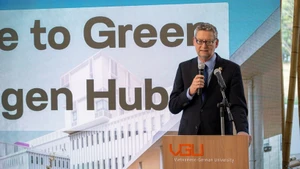To ensure this trend becomes widespread and enduring, coordinated efforts are essential across all sectors—policymakers, businesses, and consumers alike.
Consumers driving business transformation
Green consumption is a sustainable trend in which consumers favour products and services that are environmentally friendly, such as those made from recycled materials, biodegradable packaging, low-toxicity chemicals, and those that consume less energy during production and use.
In Viet Nam, this trend is expanding rapidly. Many consumers, particularly younger generations, are increasingly opting for eco-friendly products, prompting businesses to produce green goods and adopt sustainable production practices.
In Ho Chi Minh City, this trend is gaining traction across the community. Pioneering models include the MM Mega Market system, which has ceased providing plastic bags to customers for several years.
Instead, customers are offered free recycled cardboard boxes or encouraged to bring their own bags. This simple initiative helps the company eliminate over 10 million plastic bags annually, significantly reducing plastic waste.
Many consumers, particularly younger generations, are increasingly opting for eco-friendly products, prompting businesses to produce green goods and adopt sustainable production practices.
This emerging consumption habit has gradually raised awareness among customers. Hoang Trung, 29, from An Khanh Ward, Ho Chi Minh City, said, “When I shop at the supermarket, I prioritise products that are affordable, safe for health, and environmentally friendly. I choose paper packaging instead of plastic to protect the environment.”
According to a representative from MM Mega Market, alongside public awareness campaigns and support for changing consumer behaviour, the company has launched a project to process organic waste by transferring food waste to poultry farms in Dong Nai Province. To date, over 400 tonnes of organic waste have been collected and reused, significantly reducing the burden of urban waste.
In addition to waste management, MM Mega Market has invested in rooftop solar power at 14 out of 21 centres nationwide. Using renewable energy not only reduces electricity costs but also cuts over 5,000 tonnes of CO₂ emissions annually.
Urban initiatives supporting sustainable living
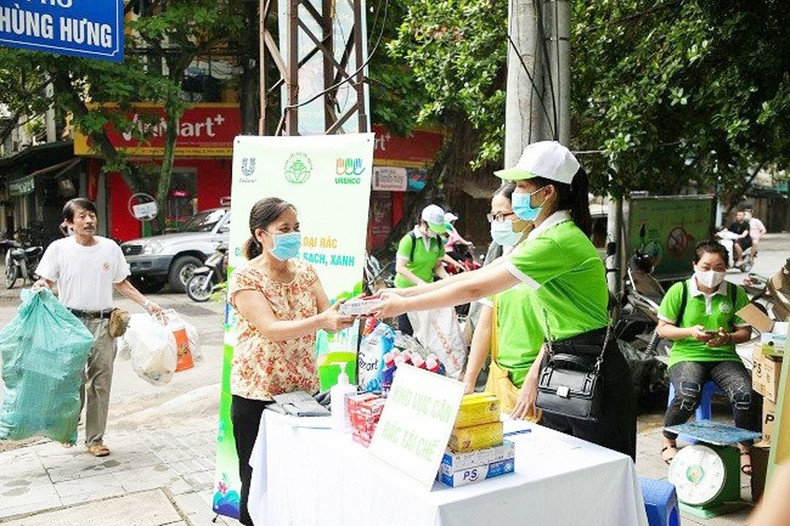
In Ha Noi, many businesses have invested in research and clean technology, enhancing competitiveness and brand value. Major supermarkets have reduced plastic bag usage, promoted reusable bags, organised reward programmes for customers who avoid plastic bags, and distributed eco-friendly packaging.
Cafeterias have adopted green practices by using bamboo or stainless steel straws and limiting the use of non-biodegradable bottled drinks.
Thu Nga, owner of a cafeteria on Trich Sai Street (Ha Noi), shared: “For over a year, my coffee shops have limited the use of straws and plastic cups, switching to paper straws, paper cups, and glass cups, even though these eco-friendly products are more expensive. This change has received much support from our customers, especially young people.”
Ha Noi is currently implementing numerous programmes to promote green consumption, such as the Sustainable Production and Consumption Programme. The city supports over 50% of distribution businesses in adopting cleaner production and energy-saving solutions, and has reduced the use of non-biodegradable packaging by 65% in local markets and shopping centres.
Ha Noi City supports over 50% of distribution businesses in adopting cleaner production and energy-saving solutions, and has reduced the use of non-biodegradable packaging by 65% in local markets and shopping centres.
Additionally, the city has organised various support programmes for businesses, including connecting sustainable production and consumption networks in lacquerware, ceramics, bamboo and rattan crafts, wood processing, and agricultural product processing.
Most recently, the Ha Noi Municipal People’s Council passed a resolution aimed at reducing plastic emissions in the city. The resolution clearly states that, from January 1, 2031, the production and import of single-use plastic products will be banned, except for those certified with the Viet Nam Eco-label. For markets and convenience stores, free non-biodegradable plastic bags will no longer be provided from January 1, 2027.
Green lifestyles are also being promoted in Can Tho City through various activities such as tree planting, community environmental protection, and campaigns to reduce waste and save energy.
In 2025, the city is advancing investment in a solid waste treatment plant with a capacity of 400–500 tonnes per day, upgrading transfer stations, and expanding mechanised waste collection routes.
According to Can Tho City leaders, the city is orienting agricultural development towards “ecological, circular, low-emission” models, linked to green value chains and sustainable consumer markets.

Overcoming challenges through unity
Although green consumption offers benefits for both consumers and the environment, its implementation in many localities still faces difficulties and challenges.
Notably, the use of pesticides and fertilisers in agriculture remains high, posing significant risks to the environment. Many farmers use pesticides habitually, without proper technique or understanding of their impact on soil and water, leading to serious pollution.
Tran Thai Nghiem, Deputy Director of Can Tho City’s Department of Agriculture and Environment, noted that farmers’ production skills have improved, but the collection and disposal of used pesticide packaging remains a difficult issue, requiring joint efforts from authorities, businesses, and farmers.
Another obstacle is that many people still lack sufficient awareness about environmental protection in their consumption habits. Meanwhile, green products and services are 20–40% more expensive than conventional alternatives, making them less accessible.
For businesses, balancing profit goals with green growth is a major challenge, especially for small and medium-sized enterprises. The cost of investing in green technology is high, and technical capacity is limited, so many businesses are not yet ready to transition to green production models.
Alongside efforts by authorities and localities to promote green consumption, society as a whole must join hands to make “living green” a positive lifestyle, spreading throughout the community.
Dr Bui Thi An, Chairwoman of the Ha Noi City Women Intellectuals Association
Dr Bui Thi An, Chairwoman of the Ha Noi City Women Intellectuals Association, stated that alongside efforts by authorities and localities to promote green consumption, society as a whole must join hands to make “living green” a positive lifestyle, spreading throughout the community.
Authorities need to build and refine legal frameworks and policies for green consumption, ensuring consistency, coherence, and transparency, she emphasised.
She also stressed the importance of intensifying public awareness campaigns to raise understanding about the significance of green consumption for the environment and human health, thereby changing societal attitudes and behaviours towards environmental protection.
Good models, experiences, and practical actions for green living and consumption should be widely shared, harmonising with nature and traditional values, and linked to the campaign “Vietnamese people prioritise Vietnamese goods.”
The collective effort of government, businesses, and citizens is the key to building a green, sustainable lifestyle for the future, she concluded.
